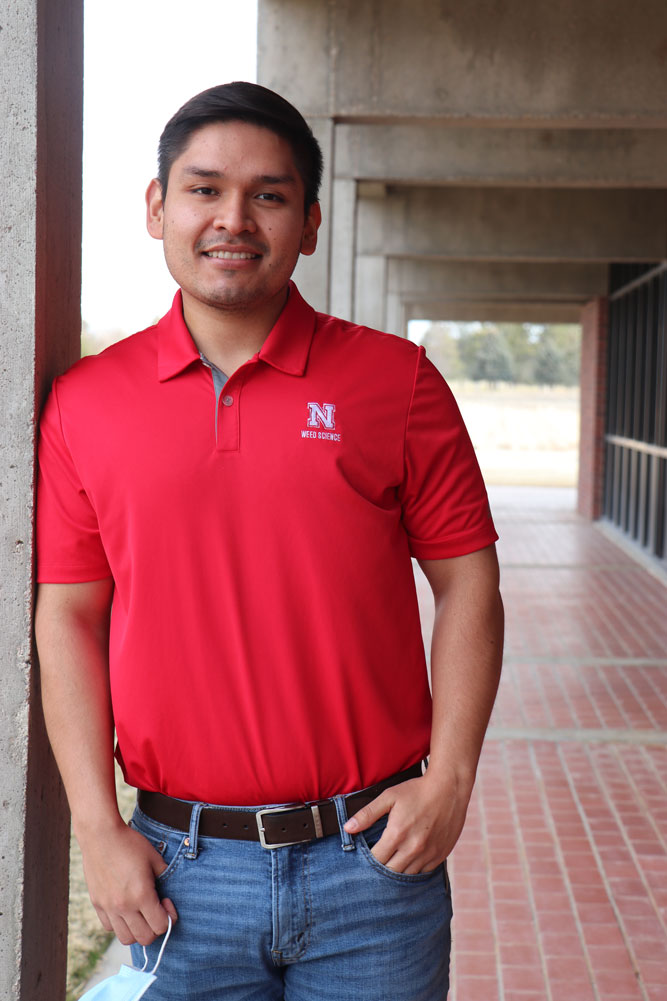This is a continuation of our "IANR is Global" series, which highlights the many ways internationalization is woven through the Institute of Agriculture and Natural Resources: through research collaboration, government and private industry partnerships, extension work, student educational experiences and the IANR community from around the world.
This edition is specifically focused on the many individuals with diverse experience from around the world who we are fortunate to have as part of our university. Joshua Miranda Teo, a native of Guatemala City, Guatemla, is a graduate research assistant and master’s student in weed science. We appreciate their wide array of contributions to the work and atmosphere of the university, and our continued mission to create a globally engaged institution. To this end, we want to help our campus community get to know each other (and the world) more, starting with these individuals.
How did your first get interested in your field? What was your previous education?
I got interested in Weed Science while I was working for Syngenta Crop Protection, a global provider of crop and seed protection products. I conducted a wide array of research on crop protection products, including seed treatments, herbicides, insecticides, fungicides, and corn variety performance in Guatemala. Working closely with growers and visiting several farms to provide technical recommendations, I saw firsthand how a lack of effective weed management approaches causes severe economic and production problems. Farmers in Central America generally do not have access to weed management information, thus relying on few cultural practices or herbicides programs year after year. I wanted to further my education in Weed Science in the US to help address this problem by generating research-based weed management recommendations.
My bachelor’s degree is in agricultural sciences and production from Escuela Agricola Panamericana Zamorano, Honduras, an agricultural university focused on hands-on education.
What have been some challenges you’ve faced here? Opportunities? Things that surprised you?
My biggest challenge at the beginning of my masters was not only starting grad school, also the fact that it was not in my native language. I think that grad school is even hard for those students that are pursuing a degree in their hometown or native language. I decided to come to the US for grad school as I saw a lot of opportunities to grow professionally and personally, and also because I was very surprised by how research is supported here. I also was surprised by how UNL and the Department of Agronomy offer a wide range of courses, ample opportunities to network and ways to solve real-life agricultural problems.
Who is your advisor? Anything you’d like to share about them? Or say to them?
My advisor is Dr. Nevin Lawrence who is the weed management specialist at the Panhandle Research, Extension, and Education Center in Scottsbluff. I really couldn’t have asked for a better mentor/advisor. He has been a very helpful all the times, always willing to help me or solve any doubt/concern I may have. I would like to thank him because he believed in that young guy (me) from the very beginning, even when I had no clue about life or weed science. I will always remember his 3 lab rules: 1. have fun, 2. have more fun, and 3. work hard.
How has your time at Nebraska impacted you in what you will go on to do?
Here at Nebraska while working at the Panhandle Research, Extension, and Education Center I have been involved in a wide range of activities, from preparing the soil to plant a crop to harvest, and not in only one crop, in several crops, even crops that are not grown in my country. I was able to be in charge in not only research projects for my thesis but also in many others projects funded by stakeholders of the region. I also was able to participate in field days where I had the chance to talk with growers and other stakeholders of the region about current issues on weed management. Thanks to these experiences I got here, I feel more comfortable and able to start conducting research projects by myself, and also interact with famers and stakeholders, which I think is something essential for scientists. Here at Nebraska I have had the opportunity to attend several conferences where I not only presented posters or talks but also was able to network with fellow graduate students and faculty from other universities, that one day we could do a research collaboration. Last but not least, I have created good friendships with fellow students at UNL that have been a constant motivation and I know these friendships are forever.
---
Do you or someone you know have an international element to your work, studies or experiences you'd like to see highlighted? Contact Brianne at bwolf4@unl.edu.
